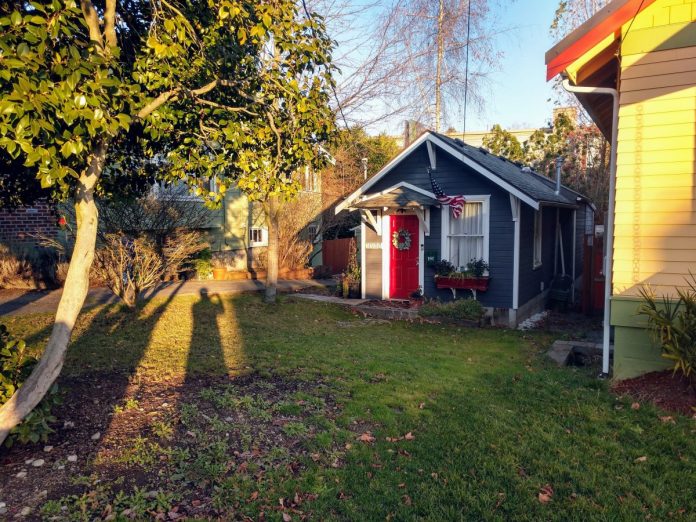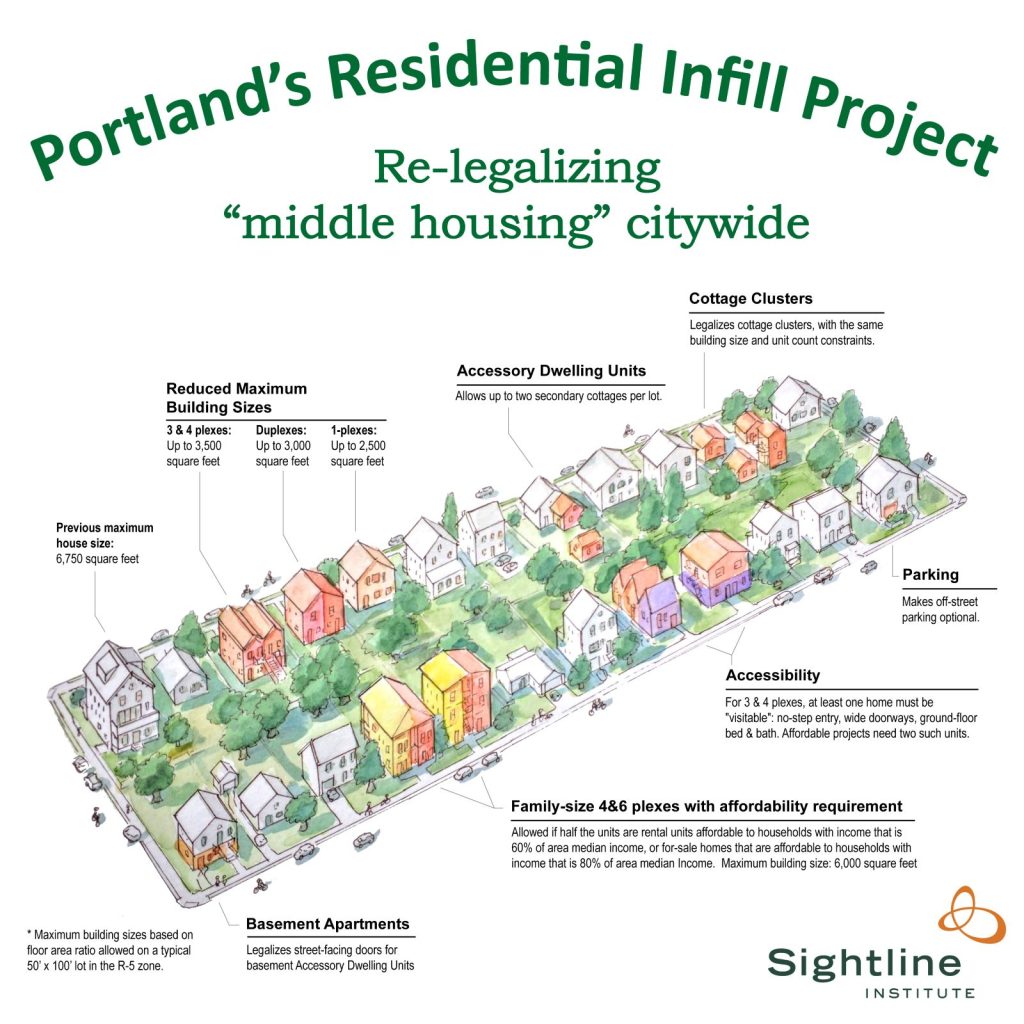
Providing more housing options in single-family zones is a policy idea that state legislators have kicked around for years. This session, the Washington State Legislature finally passed a bill that had hoped to promote accessory dwelling unit (ADU) creation, such as backyard cottages and basement apartments. There’s just one catch: housing advocates hated the bill.
A whole slew of organizations spanning labor, business, and environmental groups, including Sightline Institute, 350 Seattle, Sierra Club, the Washington State Labor Council, SEIU 775, Amazon, and AARP (which advocates for elders and retired people), urged the Governor to veto the heavily amended bill.
Governor Jay Inslee took them up on that suggestion and vetoed sections 1, 3, and 4 of SB 5235 on May 13th. Housing advocates argued those sections could actually make it harder to build an ADU on a single-family lot, not easier. Inslee noted that section 3 would delay implementation of ADU reform past the next major updates to city and county Comprehensive Plans, due in 2024 for most jurisdictions. Section 4 added a one-year owner-occupancy requirement and the ability for jurisdictions to add a public approval process to ADU projects. “I am concerned that the language may allow a local government to prevent the siting and development of accessory dwelling units in perpetuity with very little justification,” Inslee wrote.
Publicola‘s reporting cast blame on Representative Gerry Pollet (D-Seattle), who chairs the Local Government Committee where the bill was sent, for weakening the bill. The Urbanist included Pollet on the “Zero” list of our legislative recap, partially for his role in the ADU bill fiasco. Rep. Pollet reached out and I did hear his side of the story. He was able to point to some technical issues with the bill put in the House’s court by the Senate. Issues that his committee had to fix included failure to define “subdivision” in their version and use of an “R8” zoning designation that many jurisdictions do not use for their single-family zones.

If left unaddressed, those technical glitches may have unintentionally narrowed the bill’s scope, since many urban areas are not subdivisions or being subdivided when ADUs go in. However, rather than simply correct the mistakes, the House appears to have basically overwritten the bill, adding the one-year owner-occupancy requirement and the public review process to slow down production, both of which the senate has aimed to avoid. Senator Marko Liias (D-Mukilteo), who authored the bill, alluded to this in his comments before the final vote in the senate.
“Sometimes, when we pass a bill out of the Senate and send it over to the House, they really transform it into something even better and stronger than it was before. This is not one of those cases, but this policy is still important and I think that it’s worth continuing to make progress on this issue,” Liias said.
The restrictive provisions added by the House earned the ire of advocates. In their veto request letter to Governor Inslee, AARP said they hoped to establish ADU as a “by-right” housing option needing only ministerial review.
“By contrast, a conditional use permit process typically involves the application of discretionary standards, public notice of the application, and a public hearing,” AARP wrote. “Discretionary standards combined with a public hearing process create opportunities for obstruction by neighbors or organizations opposed to new housing in an established neighborhood. The cost of hiring attorneys or other experts and the delays associated with hearings and appeals can easily exhaust the budget and patience of even an affluent ADU applicant. These subjective criteria are not only cost burdensome but also deeply embedded in these private restrictions that are still valid and remain a tool in maintaining economic, racial and ethnic segregation even in situations in which the underlying zoning has been reformed.”
AARP also strongly supported eliminating owner-occupancy requirements and pointed to anti-renter bias and classism in the arguments for keeping them.
“Furthermore, under AARP’s 2020 Model State ADU Act, we suggest prohibiting any form of owner occupancy provision because the practical impact of this requirement is to inhibit construction of most ADUs. Aside from its effect on ADU production, there is a problem with the logic and fairness of applying an owner occupancy standard to ADUs if there is no such requirement with single-family homes generally. If single-family homes can be rented out (by a nonresident owner), then what is the policy basis for requiring occupancy when there is an ADU on the property?” AARP added. “Treating ADUs as a less desirable, inferior, type of housing — instead of a housing type that can benefit people of all incomes and backgrounds — will likely reinforce patterns of housing discrimination, and class and residential segregation.”
Rep. Pollet had sought to focus on the issue of short-term rentals and the alleged Airbnbifcation of ADUs, which a California study found affected only 8% of their new ADU stock. By the standard AARP proposes, treating ADUs equally with single-family homes, there wouldn’t be much reason to heap regulations on ADUs that don’t apply to single-family homes on the same property. Invoking the boogeyman of short-term rentals seems more like a convenient excuse than a widespread policy problem that necessitated the gutting of the bill.
Rep. Pollet might have a point that the Senate should have ironed out some of these language and scoping issues before sending it to his Local Government Committee — though we know that he has watered down or opposed many ADU bills that came before SB 5235. Publicola‘s Josh Feit documented Pollet’s long standing opposition to ADU liberalization.
“A quick history lesson: In 2019, Pollet watered down a pro-ADU bill proposed by Rep. Mia Gregerson (D-33, Kent) and supported by Reps. Noel Frame (D-36, Seattle), Nicole Macri (D-43, Seattle), and Joe Fitzgibbon (D-34, Seattle, Vashon Island) — to the point that the policy architects behind the bill, Sightline, pulled their support. After that, the legislation died,” Feit said. “In 2020, after Gregerson passed another sweeping pro-ADU bill through Fitzgibbon’s Environment and Energy Committee, Pollet voted against it in the Appropriations Committee (even though it was watered down), and it eventually died in the Rules committee.”

In our interview, Rep. Pollet argued he’s not anti-ADU and professed support for Portland’s model for ADUs, which included affordability incentives and packaged them as part of the Residential Infill Project of “Missing Middle” housing reform passed in 2020. Pollet said he wants to waive permitting and utility hookup fees to promote affordable ADU production. Due to gift of public funds rules, those incentives and waiving of fees would likely need to be limited to ADUs set aside as below-market, low-income housing and not used as short-term rentals, Pollet said. He also noted that easing restrictions on unrelated occupants living together in ADUs is another good provision of the bill that he supported.
“I could have killed [the bill] as chair, but I was committed to doing something on owner-occupancy as well as related occupants,” Rep. Pollet said.
Pollet also pointed to negotiations with the lobbying group the Association of Washington Cities (AWC), which represents municipalities across the state, as influencing the bill, which he intimated was needed to get the votes to pass it. Why the AWC has a hold over the House but not the Senate is beyond me, but it’s clear they do hold sway with a swath of legislators. Mandatory minimum density bills attempted in previous sessions have all withered and died after facing AWC pushback.
However, the fact remains that at the end of the day, the state has failed to liberalize ADU rules. Whatever their caveats and process complaints have been, the House really should pass a bill that isn’t watered down past the point of usefulness. The Governor’s veto has set the parameters; ADUs should be a by-right option without owner-occupancy requirements in urban growth areas across the state and implementation should be as speedy as possible. Bills masquerading as ADU liberalization but mostly adding hurdles need not apply.
Author’s note: The Rep. Pollet quote about related occupants shortly after publication.
Doug Trumm is publisher of The Urbanist. An Urbanist writer since 2015, he dreams of pedestrian streets, bus lanes, and a mass-timber building spree to end our housing crisis. He graduated from the Evans School of Public Policy and Governance at the University of Washington in 2019. He lives in Seattle's Fremont neighborhood and loves to explore the city by foot and by bike.

